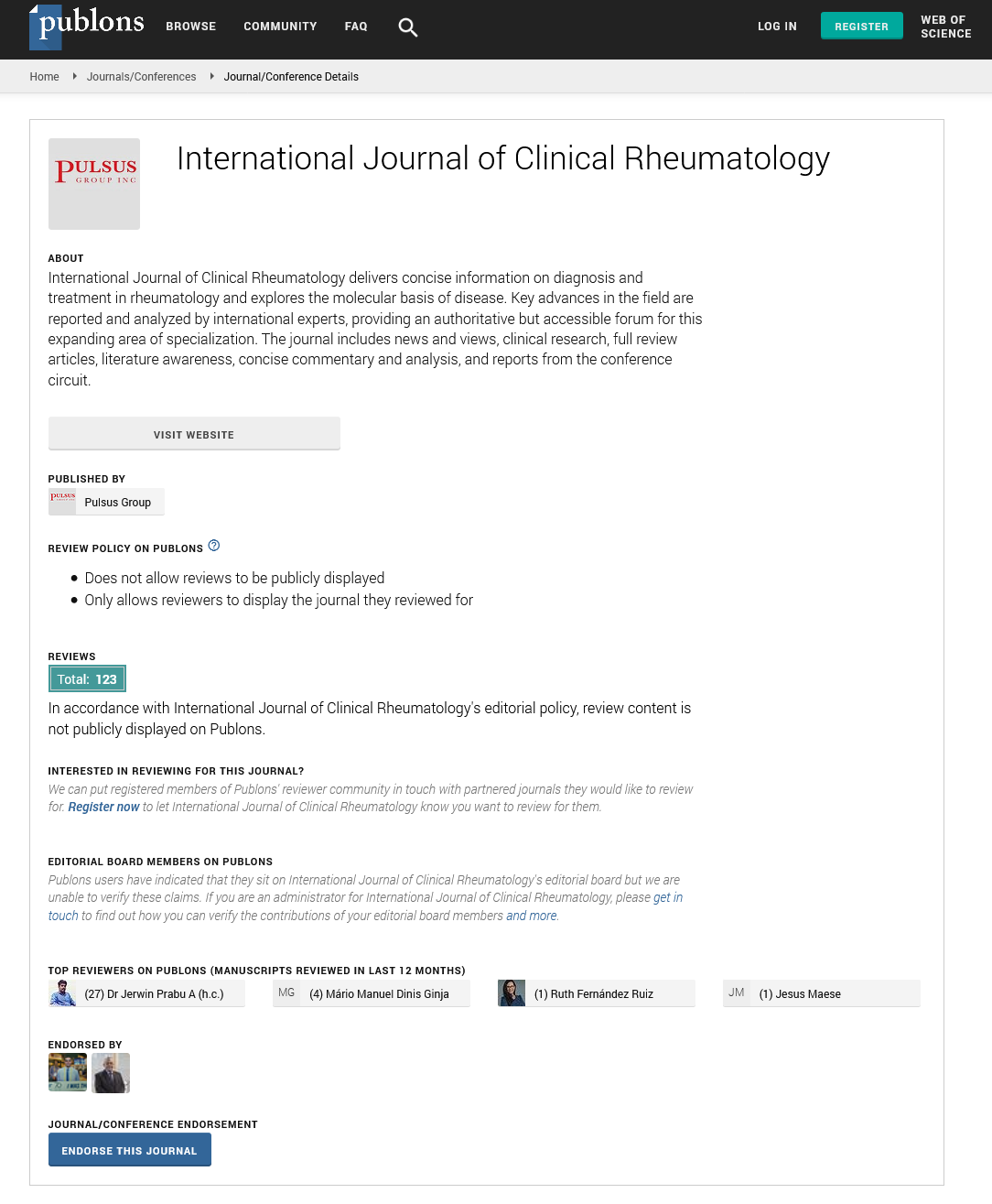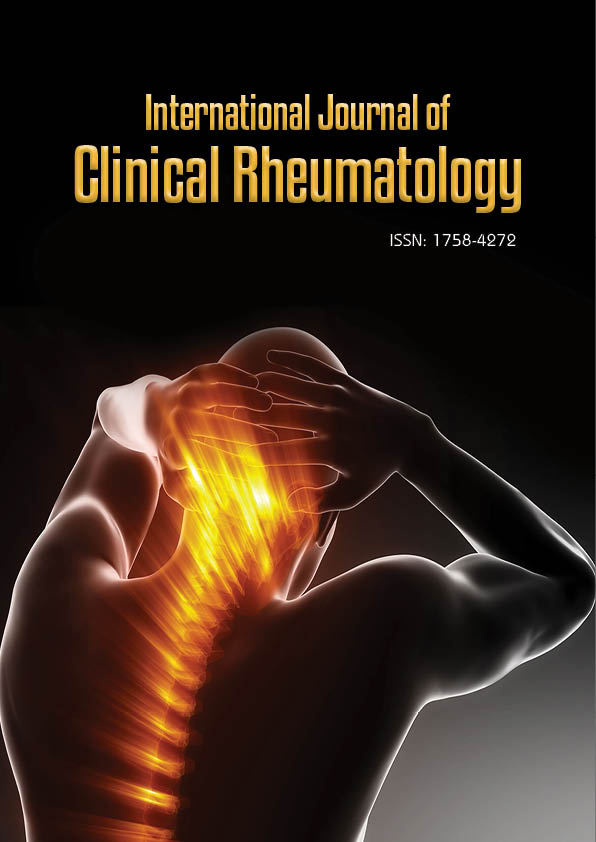Editorial - International Journal of Clinical Rheumatology (2024) Volume 19, Issue 3
Unraveling the Mysteries of Systemic Lupus Erythematosus: Understanding, Managing, and Thriving
Farzana Hussain*
Department of Orthopaedics, Yarmouk Private University, Iraq
- *Corresponding Author:
- Farzana Hussain
Department of Orthopaedics, Yarmouk Private University, Iraq
E-mail: farzana78@hotmail.com
Abstract
Systemic lupus erythematosus (SLE) is a complex autoimmune disease that affects multiple organ systems in the body, presenting a myriad of symptoms that can vary widely from person to person. Often referred to simply as lupus, this chronic condition can have a profound impact on an individual's quality of life. In this comprehensive guide, we will delve into the intricacies of systemic lupus erythematosus, exploring its causes, symptoms, diagnosis, treatment options, and strategies for living well with the condition.
Keywords
SLE • Joint pain • Rheumatology
Introduction
Systemic lupus erythematosus is characterized by an overactive immune system that mistakenly attacks healthy tissues and organs, leading to inflammation and tissue damage. While the exact cause of SLE remains elusive, it is believed to involve a combination of genetic, environmental, and hormonal factors [1, 2].
Methodology
Genetic predisposition plays a significant role in the development of SLE, with certain gene variants increasing susceptibility to the disease. Environmental triggers, such as infections, medications, ultraviolet (UV) light exposure, and hormonal fluctuations, can also precipitate lupus flares in susceptible individuals.
Symptoms of systemic lupus erythematosus
The symptoms of systemic lupus erythematosus can vary widely from person to person and may come and go in episodes known as flares. Common symptoms of SLE include:
Fatigue: Persistent fatigue and malaise are hallmark symptoms of SLE, often debilitating and impacting daily functioning.
Joint pain and swelling: Lupus can cause inflammation and pain in the joints, leading to stiffness, swelling, and decreased mobility.
Skin rash: A characteristic butterfly-shaped rash across the cheeks and nose, known as a malar rash, is common in individuals with lupus. Other skin manifestations may include discoid lesions, photosensitivity, and alopecia (hair loss).
Fever: Low-grade fever is a common symptom of lupus, often occurring during disease flares.
Kidney involvement: Lupus nephritis, or inflammation of the kidneys, is a serious complication of SLE that can lead to kidney failure if left untreated.
Chest pain and shortness of breath: Inflammation of the heart or lungs can cause chest pain, palpitations, and difficulty breathing in individuals with lupus.
Neurological symptoms: Lupus can affect the nervous system, leading to headaches, seizures, cognitive dysfunction, and mood disorders [3-6].
Diagnosis of systemic lupus erythematosus
Diagnosing systemic lupus erythematosus can be challenging due to its diverse array of symptoms and the variability of disease presentation among individuals. Healthcare providers typically rely on a combination of medical history, physical examination, laboratory tests, and imaging studies to make a diagnosis.
Blood tests are essential for diagnosing lupus and may include:
Antinuclear antibody (ANA) test: A positive ANA test is a hallmark feature of lupus, although it can also be present in other autoimmune conditions.
Blood cell counts: Abnormalities in blood cell counts, such as low red blood cells (anemia), low white blood cells (leukopenia), or low platelets (thrombocytopenia), may indicate lupus-related complications.
Autoantibody tests: Testing for specific autoantibodies, such as anti-double-stranded DNA (anti-dsDNA) antibodies and anti-Smith (anti-Sm) antibodies, can help confirm a diagnosis of lupus.
In addition to blood tests, imaging studies such as X-rays, ultrasound, or MRI scans may be performed to assess organ involvement and monitor disease progression.
Treatment options for systemic lupus erythematosus
Treatment for systemic lupus erythematosus aims to control symptoms, prevent flares, and minimize organ damage. Depending on the severity and manifestations of the disease, treatment may include:
Nonsteroidal anti-inflammatory drugs (NSAIDs): NSAIDs such as ibuprofen or naproxen can help relieve joint pain and inflammation in individuals with mild lupus symptoms.
Corticosteroids: Oral or intravenous corticosteroids may be prescribed to reduce inflammation and suppress immune activity during lupus flares.
Immunosuppressive medications: Immunosuppressants such as methotrexate, azathioprine, mycophenolate mofetil, or cyclophosphamide may be used to dampen the overactive immune response in individuals with moderate to severe lupus [7-9].
Antimalarial drugs: Hydroxychloroquine, a medication commonly used to treat malaria, has been shown to be effective in managing lupus symptoms and preventing flares.
Biologic therapies: Biologic drugs such as belimumab, which targets a specific immune system protein involved in lupus, may be prescribed for individuals with refractory disease who do not respond to conventional treatments.
In addition to medication, lifestyle modifications such as stress management, regular exercise, a balanced diet, and sun protection are essential for managing lupus and promoting overall health and well-being.
Living well with systemic lupus erythematosus
While systemic lupus erythematosus can be challenging to manage, many individuals with lupus are able to lead full and productive lives with the right support and self-care strategies. Key tips for living well with lupus include:
Educate yourself: Learn as much as you can about lupus, including its symptoms, triggers, treatments, and self-care strategies. Knowledge empowers you to take an active role in managing your health and making informed decisions about your care [10].
Build a support network: Surround yourself with a team of healthcare providers, family members, friends, and support groups who understand and can support you on your lupus journey.
Listen to your body: Pay attention to your body's signals and pace yourself accordingly. Rest when you need to, and avoid pushing yourself beyond your limits, especially during lupus flares.
Communicate openly: Be open and honest with your healthcare providers about your symptoms, concerns, and treatment preferences. Effective communication is essential for optimizing your care and achieving the best possible outcomes.
Practice self-care: Take care of your physical, emotional, and mental well-being by prioritizing self-care activities such as relaxation techniques, hobbies, and activities that bring you joy and fulfillment.
Stay positive: Maintain a positive outlook and focus on the aspects of your life that you can control. Seek out moments of joy, gratitude, and resilience to help you navigate the challenges of living with lupus.
Conclusion
In conclusion, systemic lupus erythematosus is a complex autoimmune disease that requires a multidisciplinary approach to diagnosis, treatment, and management. By understanding the causes, symptoms, diagnosis, treatment options, and strategies for living well with lupus, individuals with SLE can take proactive steps to manage their condition effectively and enhance their overall quality of life. Remember to consult with your healthcare provider for personalized guidance and recommendations tailored to your individual needs and preferences.
References
- Yehuda Z, Alper A, Scott D, et al. Aneurysmal bone cyst of mandibular condyle: A case report and review of the literature. J Craniomaxillofac Surg. 40(8), 243-248 (2012).
- Mankin HJ, Hornicek FJ, Ortiz-Cruz E, et al. Aneurysmal bone cyst: a review of 150 patients. J Clin Oncol. 23(27), 6756-6762 (2005).
- Baig R, Eady J. Unicameral (simple) bone cysts. Southern Med J. 99(9), 966-976 (2006).
- Rapp TB, Ward JP, Alaia MJ. Aneurysmal Bone Cyst. J Am Acad Orthop Surg. 20(4), 233-241 (2012).
- Rodrigues CD, Carlos E. Traumatic Bone Cyst Suggestive of Large Apical Periodontitis. J Endod. 34(4), 484-489 (2008).
- Kayani B, Sharma A, Sewell MD, et al. A Review of the Surgical Management of Extrathoracic Solitary Fibrous Tumors. Am J Clin Oncol. 41(7), 687-694 (2018).
- Choi H, Charnsangavej C, Faria SC. Correlation of computed tomography and positron emission tomography in patients with metastatic gastrointestinal stromal tumor treated at a single institution with imatinib mesylate: proposal of new computed tomography response criteria. J Clin Oncol. 25(13), 1753-1759 (2007).
- Taniguchi S, Ryu J, Seki M. Long-term oral administration of glucosamine or chondroitin sulfate reduces destruction of cartilage and up-regulation of MMP-3 mRNA in a model of spontaneous osteoarthritis in Hartley guinea pigs. J Orthop Res. 30(5), 673-678 (2012).
- Reginster J-Y, Bruyere O, Neuprez A. Current role of glucosamine in the treatment of osteoarthritis. Rheumatology. 46(5), 731-735 (2007).
- Scholtissen S, Bruyère O, Neuprez A, et al. Glucosamine sulphate in the treatment of knee osteoarthritis: cost-effectiveness comparison with paracetamol. Int J Clin Pract. 64(6), 756-762 (2010).
Indexed at, Google Scholar, Crossref
Indexed at, Google Scholar, Crossref
Indexed at, Google Scholar, Crossref
Indexed at, Google Scholar, Crossref
Indexed at, Google Scholar, Crossref
Indexed at, Google Scholar, Crossref
Indexed at, Google Scholar, Crossref


